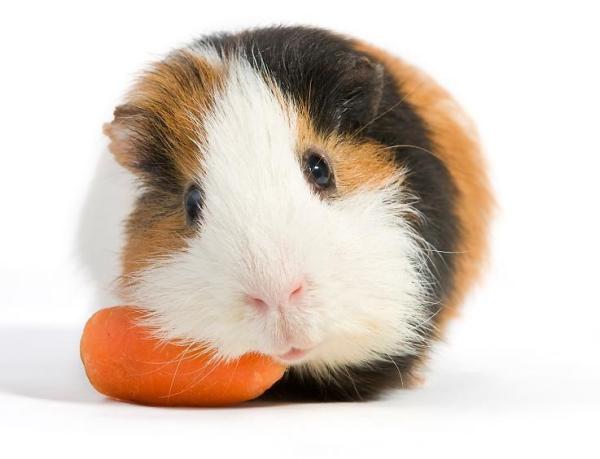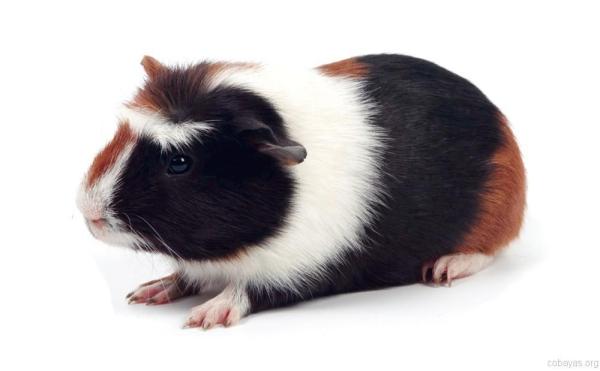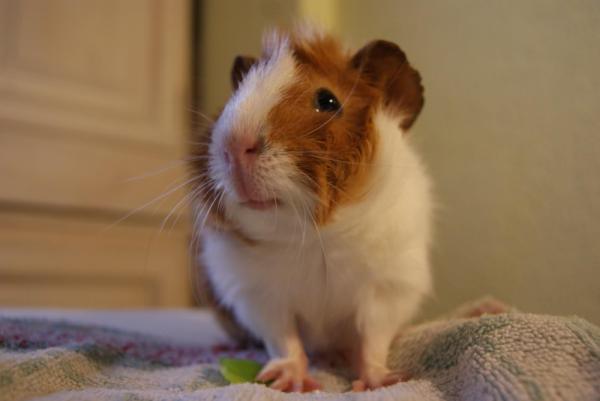
Do you have a short-haired guinea pig? You are very lucky if you have this type of rodent companion, as besides being a very intelligent and sweet pet, it needs less looking after than many of their own species.
Even so, in order to make sure that their health doesn't suffer and it lives a long and happy life in its new home, you must a few guidelines on care, hygiene, food and habitat. If you have questions about this, read this AnimalWised article to find out everything you need to know about how to care for a short-haired guinea pig.
The guinea pig as a companion animal
There are several breeds of guinea pigs with short, straight and smooth hair, such as the American, the Crested, the Teddy and Rex - in any case regardless of the breed and even the length of hair.
The guinea pig is a gregarious animal, meaning that in the wild it lives in colonies with several others. This translates into the need for companionship and socialization. It is better to get two of the same sort, such as two females, so that they don't fight.
If you aren't able to do this, we recommend that you spend time and care on it, as this is a social and sweet animal that will look for you and recognize you. To strengthen your bond you can give it food straight from your hand.

Feeding the guinea pig
The guinea pig is a 100% herbivorous rodent, so their diet should be based on fruits and vegetables. It's hugely important to provide them with feeds in the form of hay, as this will ensure an appropriate intake of fiber.
When it comes to fruits and vegetables, you will always need to choose those which are richest in vitamin C, since this nutrient is essential for the guinea pig (they can only obtain it through their diet). If you choose to feed them with specific guinea pig feed, then it should already contain the recommended amounts of vitamin C.
To feed a short-haired guinea pig correctly do not forget these points:
- Always have fresh, clean water.
- Always have fresh and unlimited hay.
- We need to control the rations of feed or pellets, to prevent obesity.
- We need to provide daily vegetables and varied fruits.
What vegetables and fruits can guinea pigs eat?
As it contains a high amount of sugar, fruit should be considered a reward or an anecdotal ration. Therefore, we should focus on vegetables. We can offer them a salad, a portion of various vegetables ... If you want to know more, do not hesitate to visit our post on vegetables and fruits that are good for guinea pigs.
We recommend that you try different foods and investigate which ones your guinea pig likes the most. Dandelion, lamb's lettuce, escarole, arugula or peppers are especially pleasing for them, but we can surprise them with other vegetables.

The guinea pig's habitat
The short-haired guinea pig should have an appropriately sized space. Here, we're talking about a cage of approximately 120 x 60 x 45 cm according to the Royal Society for the Prevention of Cruelty to Animals.
Within their cage, the guinea pig should have a series of things. These include a small hutch where they can sleep in, soft bedding scattered over the floor, a food bowl and a water bowl or water dispenser.
There are various types of wood chips and synthetic materials available, but you need to be sure to choose one which is designed specifically for small animals; some types contain oils which can be dangerous, and the dust from wood can cause respiratory problems. Actually, a cheaper and ecological solution would be to use some simple black and white newspaper! It is much easier to clean up too!
It is important for you to place the cage in a place where the temperature is between 18 °C and 24 °C (64.4°F and 75.2°F), and it's preferable for you to keep the cage inside. This is because short-haired guinea pigs are extremely sensitive to the cold.
The water should be re-filled on a daily basis, and it's recommended that the cage is cleaned once a week and completely disinfected once a month. You must also make sure that its surroundings are clean. Make sure you keep it clear from extreme temperatures, such as drafts of wind or direct sunlight.

Health care
Guinea pigs are usually very healthy if their owners follow all of the aforementioned tips. However, you still need to be very vigilant with parasites, since these animals commonly suffer from infestations.
How I can i tell if my guinea pig is ill?
Guinea pigs do not always show that they are sick, so generally the first symptom of disease is that you will notice the guinea pig hiding in a corner, apathetic and sad. In this situation you should take them to an exotic pets veterinarian as soon as possible, however, if you do not have one nearby, you can go to a conventional veterinarian, since a professional must have the minimum knowledge to assess them.
Some signs that indicate that something is not going well may be:
- Wounds on the skin
- Wounds on legs
- Diarrhea
- Excessive scratching
- Presence of parasites
- Hair loss
- Being overweight
- Your guinea pig does not eat or drink ...
In this situation you should calmly explore your guinea pig and touch them to see if any specific area of the body hurts. Although they are docile animals, they easily stress and shriek in a shrill way.
What does my guinea pig need?
Guinea pig owners often buy wheels for their little rodents to exercise well without leaving their cage. However, wheels are not suitable for guinea pigs. They are great for hamsters, mice and gerbils, but can cause back pain and spinal injury in guinea pigs. They are not so agile.
From time to time, and especially if they get very dirty, it is also important to wash your guinea pig in warm water with baby soap. Dry them with a towel, and never with a hairdryer.
It is also important that you brush them with a soft, small brush. By doing so, you will get rid of the dead hair and give them an extra shine.
Food is another important element to keep in mind. A guinea pig that has stopped eating for 12 hours has a poor prognosis, but those who have spent more than 24 hours without eating are in critical condition.
One of the most common problems with guinea pigs is overgrown teeth, which can only be prevented by always having hay at their disposal, which should be high quality, greener and longer.
Wounds can become infected, so be sure to clean them with betadine. If they are very deep you should also go to an expert.
Guinea pigs also regularly suffer from stress, usually around the time when you adopt them. You should avoid noise, aggressive companions or incomplete diets.

If you want to read similar articles to How to Take Care of a Short-Haired Guinea Pig, we recommend you visit our Basic care category.